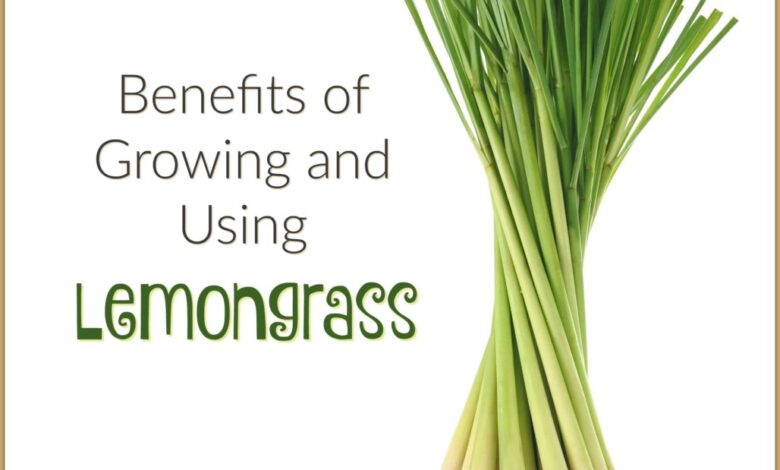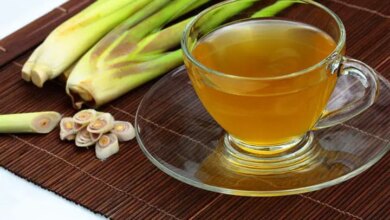
Lemongrass Amazing Health Benefits
Discover the Surprising Health Benefits of Lemongrass for Your Body. This article delves into the fascinating world of lemongrass, revealing its remarkable potential to boost your well-being. From aiding digestion to supporting your immune system, lemongrass offers a plethora of health advantages. We’ll explore its historical use, chemical composition, and various ways it can enhance your overall health, from improving digestion to potential weight management support.
Get ready to uncover the secrets of this versatile herb!
Lemongrass, with its citrusy aroma and vibrant green stalks, has been a cherished ingredient in various cuisines and traditional medicines for centuries. This article will delve into the science behind its purported health benefits, exploring the potential mechanisms through which lemongrass impacts different bodily functions.
Introduction to Lemongrass

Source: keepfitkingdom.com
Lemongrass, scientifically known asCymbopogon citratus*, is a perennial grass native to tropical and subtropical regions. Characterized by its tall, fibrous stalks and distinctive lemony aroma, it’s widely used in culinary preparations, traditional medicine, and as a fragrant component in perfumes and cosmetics. The unique flavor profile makes it a popular ingredient in Southeast Asian, Indian, and other cuisines.
Its widespread use is rooted in its historical significance across various cultures.This article delves into the fascinating world of lemongrass, exploring its remarkable chemical composition and highlighting its potential health benefits. We’ll examine how this versatile plant, beyond its culinary applications, might contribute to overall well-being. The following sections will uncover the surprising ways lemongrass can impact your health, exploring its various potential uses.
Botanical Classification and Common Uses
Lemongrass belongs to thePoaceae* family, which encompasses grasses. Its aromatic nature stems from volatile compounds within its leaves and stalks. Culinary applications are extensive, including use in soups, stir-fries, and as a refreshing tea. Traditionally, lemongrass is used in herbal remedies, particularly in Southeast Asian cultures.
Historical Context
The use of lemongrass extends back centuries. In traditional Asian medicine, it’s been valued for its potential medicinal properties. Ancient texts describe its use for treating various ailments, including digestive issues and respiratory problems. The continued popularity of lemongrass in modern cuisine and health products speaks to its enduring appeal.
Chemical Composition
Lemongrass is rich in bioactive compounds, contributing to its aromatic properties and potential health benefits. Key components include citral, which is responsible for its lemony aroma and contributes to its purported health benefits. Other compounds include limonene, geraniol, and cineole, each with potential health-promoting effects.
Overview of Health Benefits
This article will explore the potential health benefits associated with lemongrass consumption. We will analyze the impact of various components on specific bodily functions. The following table summarizes the potential health benefits associated with different parts of the lemongrass plant:
| Lemongrass Part | Potential Health Benefit |
|---|---|
| Leaves and Stalks | Anti-inflammatory, antioxidant, potential digestive aid |
| Essential Oil | Potential antimicrobial, anti-fungal, and pain-relieving properties |
Digestive Health Benefits
Lemongrass, with its invigorating aroma and citrusy notes, offers more than just a pleasant culinary experience. Its potential benefits extend to digestive health, promising relief from various discomforts and supporting overall gut well-being. Research suggests that lemongrass possesses compounds that can interact positively with the digestive system.Lemongrass’s impact on digestion stems from its multifaceted properties. It’s often touted for its carminative properties, which can help reduce gas and bloating, common issues associated with indigestion.
The presence of certain compounds, like essential oils, might contribute to its ability to soothe the digestive tract and promote healthy bowel movements.
Role in Improving Digestion
Lemongrass’s role in improving digestion is multifaceted, encompassing several mechanisms. Its carminative properties, primarily attributed to its essential oils, help expel excess gas, easing bloating and discomfort. This effect is often observed in individuals experiencing digestive issues like flatulence. Moreover, lemongrass may also stimulate the production of digestive enzymes, which are crucial for breaking down food efficiently.
Impact on Gut Health
Lemongrass’s potential impact on gut health is tied to its ability to influence the gut microbiome. By supporting healthy gut bacteria and reducing inflammation, lemongrass may contribute to a balanced gut environment. This balance is vital for proper digestion and nutrient absorption. However, further research is needed to fully understand the precise mechanisms and extent of this effect.
Reducing Indigestion
Lemongrass can potentially aid in reducing indigestion by targeting specific contributing factors. Its carminative properties can lessen the build-up of gas, a common cause of indigestion. Additionally, its potential to stimulate digestive enzymes might improve the overall efficiency of food breakdown, minimizing discomfort and promoting better digestion. Incorporating lemongrass into meals or beverages might contribute to more efficient digestion and alleviate symptoms of indigestion.
Supporting Healthy Bowel Movements
Lemongrass might contribute to healthy bowel movements through its potential to stimulate peristalsis, the rhythmic contractions that move food through the digestive tract. This effect could potentially help prevent constipation and promote regularity. However, it’s important to remember that lemongrass is not a substitute for proper hydration and a balanced diet. Consistency in lifestyle and diet play a significant role in maintaining healthy bowel habits.
Lemongrass Remedies for Digestive Issues
| Symptom | Lemongrass Remedy | Mechanism |
|---|---|---|
| Gas and Bloating | Lemongrass tea, infused water | Carminative properties reduce gas build-up |
| Indigestion | Lemongrass-infused dishes | Stimulates digestive enzymes, eases discomfort |
| Constipation | Lemongrass tea, incorporating into meals | Potential stimulation of peristalsis, promoting regularity |
Antioxidant Properties
Lemongrass, with its vibrant aroma and citrusy notes, boasts more than just a pleasant fragrance. It’s packed with powerful antioxidants, compounds that play a crucial role in protecting your body from cellular damage. These natural protectors can contribute to overall well-being by combating the effects of free radicals, which are unstable molecules that can harm cells.The antioxidant properties of lemongrass are attributed to the presence of various phytochemicals.
These plant-based compounds, like flavonoids and phenolic acids, act as potent scavengers, neutralizing free radicals and preventing oxidative stress. These protective mechanisms are important in maintaining optimal health and preventing chronic diseases.
Specific Antioxidant Compounds
Lemongrass contains a variety of compounds known for their antioxidant activity. Key components include citral, citronellal, geraniol, and various phenolic acids. These compounds work synergistically to provide a robust defense against cellular damage. The concentration of these compounds can vary based on factors like cultivation methods and processing techniques.
How Antioxidants Protect Against Cellular Damage
Antioxidants work by donating an electron to a free radical. This process neutralizes the free radical, preventing it from damaging healthy cells. This prevents the chain reaction of oxidative stress, a key contributor to aging and various health problems. In essence, antioxidants act as cellular protectors, safeguarding against the detrimental effects of free radicals.
Comparison to Other Foods
The antioxidant capacity of lemongrass is comparable to other fruits and vegetables. While precise comparisons can vary based on testing methods and specific varieties, lemongrass generally demonstrates a high antioxidant capacity. For instance, berries and dark leafy greens are also known for their substantial antioxidant content. The specific antioxidant profile and concentration in lemongrass may vary slightly depending on the growing conditions and processing methods.
Benefits of Antioxidants in the Body
Antioxidants play a vital role in maintaining overall health and well-being. They contribute to protecting cells from damage, reducing inflammation, and supporting a healthy immune system. By neutralizing free radicals, antioxidants help to prevent premature aging and the development of various chronic diseases.
Antioxidant Content Comparison
| Herb | Estimated Antioxidant Capacity (Based on Research Data) |
|---|---|
| Lemongrass | High |
| Green Tea | Very High |
| Blueberries | Very High |
| Spinach | High |
| Ginger | Moderate |
Note: The table above provides a general comparison. Exact antioxidant capacity values can differ depending on the specific variety, growing conditions, and testing methods. Further research is continuously being conducted to further refine these comparisons.
Immune System Support

Source: naturalfoodseries.com
Lemongrass, with its aromatic zest, offers more than just a pleasant scent. Its potential benefits extend to bolstering the immune system, a crucial aspect of overall health. This support comes from various bioactive compounds that may contribute to a stronger defense against infections and inflammation.Lemongrass’s immune-boosting properties stem from its rich composition of phytochemicals. These compounds, acting as natural antioxidants and anti-inflammatory agents, may help regulate the body’s immune response, making it more effective in fighting off pathogens and maintaining homeostasis.
The specific mechanisms behind this support are still being researched, but existing studies suggest potential avenues through which lemongrass may positively impact immune function.
Unveiling the surprising health benefits of lemongrass is fascinating! But did you know turmeric also plays a crucial role in digestion? Check out this comprehensive guide on The Ultimate Guide to Using Turmeric for Better Digestion to learn more about its powerful effects. Ultimately, incorporating both lemongrass and turmeric into your wellness routine could lead to a healthier you!
Mechanisms of Immune System Enhancement
Lemongrass’s immune-enhancing capabilities likely involve multiple interacting pathways. Studies suggest that the compounds in lemongrass might influence the activity of immune cells, such as lymphocytes and macrophages, which play crucial roles in the body’s defense mechanisms. These interactions may lead to a more robust immune response, enabling the body to effectively combat infections and maintain a healthy state.
Additionally, lemongrass’s potential anti-inflammatory properties may reduce the body’s inflammatory response, which is sometimes detrimental to the immune system when excessive.
Combating Infections
The presence of certain compounds in lemongrass, like limonene and citral, might contribute to its potential in combating infections. These compounds exhibit antimicrobial properties, meaning they may directly inhibit the growth or activity of harmful microorganisms. This antimicrobial action could contribute to the body’s defense against infections. However, further research is needed to fully understand the extent of this effect.
Managing Inflammation
Inflammation, while a necessary bodily response, can become detrimental when prolonged. Lemongrass, due to its anti-inflammatory properties, may help moderate this response. By reducing inflammation, lemongrass may contribute to a healthier immune system, as excessive inflammation can negatively impact the effectiveness of immune responses.
Immune Function and Lemongrass’s Role
| Immune Function | Lemongrass’s Role |
|---|---|
| Stimulating immune cell activity | Lemongrass compounds may enhance the function of immune cells, like lymphocytes and macrophages, leading to a more effective response to pathogens. |
| Antioxidant activity | Antioxidants in lemongrass may neutralize harmful free radicals, which can contribute to inflammation and immune dysfunction. |
| Anti-inflammatory effects | Lemongrass compounds may reduce inflammation, which is essential for maintaining a healthy immune response and preventing overactivation of the immune system. |
| Combating infections | Certain compounds in lemongrass might exhibit antimicrobial properties, potentially aiding in the fight against infections. |
Potential for Weight Management
Lemongrass, with its invigorating aroma and citrusy notes, has long been a culinary and medicinal staple in many cultures. Beyond its culinary uses, research suggests potential links between lemongrass consumption and weight management. While more robust studies are needed, preliminary findings hint at mechanisms that could contribute to its potential role in weight loss or maintenance.Lemongrass may contribute to weight management through a combination of factors, including its potential impact on metabolism, appetite regulation, and overall well-being.
The compounds present in lemongrass may interact with various bodily functions to influence weight-related processes. It’s crucial to remember that lemongrass should be considered as one component of a comprehensive approach to weight management, rather than a standalone solution.
Metabolic Effects
Lemongrass contains compounds that may potentially influence metabolic rate. Some studies suggest that certain compounds might stimulate thermogenesis, a process where the body generates heat, thus potentially increasing energy expenditure. This increased energy expenditure could contribute to a calorie deficit, potentially aiding in weight loss or maintenance. However, more rigorous research is needed to definitively quantify these effects and understand their clinical relevance.
Impact on Appetite Regulation
The unique flavor profile and potential digestive benefits of lemongrass may also influence appetite regulation. The aromatic components and potential to promote satiety may play a role in managing hunger cues. Preliminary research suggests that compounds in lemongrass might affect the release of hormones associated with appetite, such as ghrelin and leptin, although more research is needed to understand the exact mechanisms and their clinical significance.
Weight Management Strategies and Lemongrass Application
| Weight Management Strategy | Lemongrass Application |
|---|---|
| Increased Physical Activity | Incorporate lemongrass-infused water or tea into your routine during and after workouts to aid hydration and potentially enhance recovery. |
| Balanced Diet | Use lemongrass in stir-fries, soups, or teas as a flavorful and healthy addition to meals. This can help to make meals more appealing and potentially reduce cravings for less healthy alternatives. |
| Stress Management | Enjoy the calming aroma of lemongrass through aromatherapy or by adding it to your bath. Stress can significantly impact appetite and metabolism, so managing stress can contribute to weight management. |
| Improved Sleep Hygiene | Consider adding lemongrass to your nighttime tea or bath to promote relaxation and potentially improve sleep quality, as sleep plays a significant role in metabolism and appetite regulation. |
Potential for Blood Sugar Regulation
Lemongrass, with its aromatic essence, offers a captivating array of potential health benefits, extending far beyond its culinary applications. One intriguing area of exploration revolves around its possible role in managing blood sugar levels. While further research is needed to definitively establish the extent of these effects, preliminary evidence suggests a promising connection between lemongrass consumption and improved blood sugar control.
Unveiling the surprising health benefits of lemongrass is fascinating! From boosting immunity to potentially aiding digestion, this humble herb offers a wealth of potential. But what about other natural remedies? Have you considered if ginger might actually help manage stress and improve focus? For a deeper dive into the potential stress-reducing and cognitive-enhancing effects of ginger, check out this insightful article: Can Ginger Really Help You Manage Stress and Improve Focus?
Regardless, lemongrass continues to be a compelling choice for a healthy lifestyle, offering various potential benefits for your well-being.
Potential Links Between Lemongrass Consumption and Blood Sugar Control
Lemongrass possesses compounds that may contribute to maintaining healthy blood sugar levels. These compounds, along with the potential for improved insulin sensitivity, might play a role in preventing blood sugar spikes and promoting overall metabolic health. Studies on animals and preliminary human research indicate potential benefits, although more extensive clinical trials are required to fully understand the impact on human subjects.
Impact of Lemongrass on Insulin Sensitivity
Lemongrass’s impact on insulin sensitivity is a key area of interest. Insulin sensitivity refers to how effectively the body utilizes insulin to transport glucose from the bloodstream into cells for energy. Improved insulin sensitivity allows the body to regulate blood sugar levels more effectively, preventing fluctuations. Preliminary research suggests that lemongrass might enhance insulin sensitivity, but more rigorous studies are necessary to confirm these findings and quantify the effect.
Potential Mechanisms for Blood Sugar Regulation
Several potential mechanisms may explain how lemongrass might influence blood sugar regulation. These mechanisms include the potential of certain compounds in lemongrass to stimulate insulin secretion, improve insulin sensitivity, and potentially reduce glucose production in the liver. Further research is essential to validate these hypothesized mechanisms and fully understand the intricate interactions involved.
“The exact mechanisms by which lemongrass affects blood sugar are not fully understood, but several potential pathways are being investigated.”
Ever wondered about the surprising health benefits of lemongrass? It’s packed with antioxidants and vitamins. While we’re on the topic of natural remedies, did you know that moringa leaves are also fantastic for detoxifying and boosting energy levels? Check out How Moringa Leaves Help Detox Your Body and Improve Energy Levels for more on that.
Regardless, lemongrass continues to be a powerful natural remedy for overall well-being, so keep exploring its benefits!
How Lemongrass Might Help Prevent Spikes in Blood Sugar
Lemongrass may help prevent blood sugar spikes by potentially enhancing the body’s response to glucose absorption. This enhanced response could help to stabilize blood sugar levels and mitigate the risk of post-meal spikes. A more precise understanding of the intricate interactions involved requires further research.
Table: Potential Impact of Lemongrass on Blood Sugar
| Blood Sugar Level | Lemongrass Impact | Mechanism |
|---|---|---|
| Elevated blood sugar after meals | May help to moderate the increase in blood glucose levels | Potentially by influencing insulin secretion and glucose absorption. |
| Consistent high blood sugar | May contribute to improved long-term blood sugar control | Possible improvement in insulin sensitivity and glucose metabolism. |
| Pre-diabetes or early stages of diabetes | May aid in managing blood sugar | By modulating insulin action and potentially reducing glucose production in the liver. |
Other Potential Health Benefits
Lemongrass, beyond its culinary and digestive advantages, holds intriguing potential in various aspects of well-being. Its aromatic nature suggests applications in aromatherapy and skincare, while its historical use hints at further traditional medicinal roles. Exploring these facets reveals a more comprehensive understanding of this versatile plant.Lemongrass’s inherent properties make it a candidate for stress reduction and support for specific conditions.
Understanding its traditional uses and potential mechanisms of action allows for a more informed perspective on its multifaceted role in health and wellness.
Skincare Applications
Lemongrass extract, rich in antioxidants and anti-inflammatory compounds, shows promise in skincare. Its potential to soothe irritated skin and promote a healthy complexion is an area of ongoing research. Some topical applications utilize lemongrass oil for its potential to reduce acne and blemishes. However, it’s crucial to note that individual sensitivities to lemongrass compounds exist, and caution is advised when using it topically.
Aromatherapy and Stress Relief
Lemongrass oil’s refreshing aroma has long been employed in aromatherapy practices. Inhaling lemongrass essential oil is believed to promote relaxation and reduce feelings of stress. The scent’s ability to invigorate and uplift may be beneficial for those experiencing mild stress or anxiety. It is important to remember that aromatherapy is not a replacement for professional medical advice or treatment.
Traditional Uses
Lemongrass has a rich history of use in traditional medicine systems. In some cultures, it’s used for treating colds, fevers, and muscle aches. Further research is needed to validate these traditional applications. This underscores the importance of exploring the historical context alongside modern scientific investigation.
Potential Treatment for Specific Conditions
While lemongrass shows promise in various areas, more research is needed to establish its effectiveness as a treatment for specific conditions. Its potential role in supporting overall health and well-being is an active area of investigation. However, lemongrass should not be used as a replacement for conventional medical treatments.
Table of Potential Benefits and Mechanisms
| Potential Benefit | Mechanism |
|---|---|
| Skincare (acne reduction) | Anti-inflammatory and antioxidant properties potentially reduce inflammation and oxidative stress, leading to a healthier complexion. |
| Stress Relief (aromatherapy) | The aroma of lemongrass oil may stimulate the nervous system, promoting relaxation and reducing feelings of stress. |
| Traditional uses (colds, fevers) | Historical use suggests potential antiviral and antipyretic effects, but further scientific evidence is required. |
Safety and Precautions

Source: diynatural.com
Lemongrass, while generally considered safe for consumption, like any herbal remedy, may pose potential risks for certain individuals. Understanding its safety profile and potential side effects is crucial for responsible use. This section will explore the precautions and contraindications associated with lemongrass consumption, highlighting when to seek professional medical advice.
Safety Profile of Lemongrass
Lemongrass is generally well-tolerated by healthy adults when consumed in moderate amounts. However, individual sensitivities and underlying health conditions can influence its effects. The active compounds in lemongrass, such as citral, can potentially cause adverse reactions in susceptible individuals.
Potential Side Effects
Several potential side effects can arise from consuming lemongrass, ranging from mild discomfort to more serious reactions. It is important to be aware of these possibilities and to discontinue use if any adverse effects occur.
- Allergic Reactions: Some individuals may experience allergic reactions, including skin rashes, itching, swelling, or difficulty breathing, after consuming lemongrass. These reactions are typically mild but can be more severe in some cases.
- Gastrointestinal Issues: Excessive consumption of lemongrass can sometimes lead to digestive problems such as nausea, vomiting, diarrhea, or abdominal cramps. These symptoms usually subside upon reducing or discontinuing consumption.
- Interactions with Medications: Lemongrass may interact with certain medications, potentially altering their effectiveness or increasing the risk of side effects. This is especially important for individuals taking blood thinners or medications affecting blood sugar levels.
- Possible Liver Issues: While rare, excessive lemongrass consumption may, in some cases, put a strain on the liver. This risk is typically associated with high doses consumed over extended periods.
Contraindications
Certain individuals should exercise caution or avoid lemongrass entirely due to potential health risks. Pregnant or breastfeeding women, individuals with specific medical conditions, and those taking particular medications should consult with a healthcare professional before using lemongrass.
- Pregnant and Breastfeeding Women: Limited research exists regarding the safety of lemongrass use during pregnancy and breastfeeding. It is advisable to avoid consumption during these periods unless advised by a doctor.
- Individuals with Specific Medical Conditions: Individuals with liver or kidney issues, or those with a history of allergies, should consult a healthcare professional before using lemongrass. The potential interactions with existing conditions need careful consideration.
- Individuals Taking Medications: Lemongrass may interact with certain medications, such as blood thinners or those affecting blood sugar levels. Always consult a healthcare professional before using lemongrass if you are taking any medications.
Recommendations for Safe Consumption
To maximize the potential health benefits of lemongrass while minimizing risks, follow these guidelines for safe consumption.
- Start with Small Amounts: Begin with a small amount of lemongrass and gradually increase intake to assess your body’s response. This approach allows for a personalized tolerance level.
- Moderate Consumption: Avoid excessive consumption of lemongrass. Moderate intake is generally safe and effective.
- Quality of Lemongrass: Use fresh, high-quality lemongrass to reduce the risk of contaminants and ensure optimal benefits.
- Consult a Healthcare Professional: If you have any underlying health conditions, are pregnant, breastfeeding, or taking any medications, consult a healthcare professional before using lemongrass.
When to Consult a Healthcare Professional, Discover the Surprising Health Benefits of Lemongrass for Your Body
If you experience any adverse effects after consuming lemongrass, discontinue use and consult a healthcare professional immediately. This is crucial to ensure proper diagnosis and treatment.
| Possible Side Effects | Precautions |
|---|---|
| Allergic reactions (skin rash, itching, swelling, difficulty breathing) | Discontinue use and seek medical attention immediately. |
| Gastrointestinal issues (nausea, vomiting, diarrhea, abdominal cramps) | Reduce or discontinue consumption. If symptoms persist, consult a doctor. |
| Interactions with medications | Consult a healthcare professional before using lemongrass if you are taking any medications. |
| Possible liver issues (rare) | Avoid excessive consumption and consult a doctor if concerned. |
Preparation and Consumption Methods
Unlocking the full potential of lemongrass involves understanding its versatile preparation methods. From refreshing teas to aromatic soups and stir-fries, lemongrass’s subtle yet distinctive flavor profile enhances a wide array of dishes. Learning how to prepare it correctly ensures you experience its maximum health benefits.
Various Preparation Methods
Lemongrass’s versatility extends beyond its use in cooking. It can be enjoyed in various forms, each method highlighting different aspects of its flavor and aroma. Proper preparation is key to extracting the most from this valuable herb.
- Fresh Use: Fresh lemongrass stalks can be sliced or chopped to add a fragrant touch to stir-fries, soups, and curries. The vibrant green stalks add a visually appealing element to any dish.
- Dried Use: Dried lemongrass can be used similarly to fresh, offering a concentrated flavor. Dried pieces can be added to hot beverages or used as a base for aromatic stews. The flavor will be more intense than fresh.
- Infused Oils: Lemongrass can be infused into oils to create flavorful dressings or marinades. This method allows for a more subtle integration of the herb into dishes, preserving its delicate essence. Infusing lemongrass into oil is an excellent way to add a refreshing touch to salads or vegetables.
- Lemongrass Tea: Steeping lemongrass stalks in hot water creates a soothing and aromatic tea. This method highlights the herb’s natural sweetness and subtle citrus notes. Adding honey or lemon can enhance the flavor profile.
Recipes Incorporating Lemongrass
Many culinary traditions utilize lemongrass. Its versatility allows for its incorporation into diverse recipes, from Asian-inspired dishes to more Western-style meals. Experimenting with different preparation methods allows for personalized flavors.
- Lemongrass Chicken Soup: A classic example, chicken soup infused with lemongrass provides a flavorful and comforting meal. The lemongrass adds a subtle citrusy taste to the broth, enhancing the overall experience.
- Lemongrass Stir-fry: Lemongrass complements various vegetables and proteins beautifully in stir-fries. Its fragrant aroma and subtle flavor elevate the dish, creating a vibrant and healthy meal. Stir-fries can be adapted to suit individual preferences.
- Lemongrass-Ginger Marinade: Lemongrass and ginger combine for a delicious marinade for chicken or fish. This marinade adds a flavorful and aromatic twist to these dishes, creating a unique culinary experience. The ginger and lemongrass combination adds a touch of spice and sweetness.
Incorporating Lemongrass into Your Daily Routine
Integrating lemongrass into your daily routine is easy and beneficial. From a simple tea to a flavorful soup, incorporating lemongrass into your diet can offer numerous health benefits.
- Daily Tea: A cup of lemongrass tea in the morning can help start your day with a refreshing and healthy beverage. The antioxidants and subtle citrus notes can invigorate your senses.
- Adding to Soups and Stews: Incorporating lemongrass into your soups and stews provides a flavorful boost to your meals, adding a unique touch of Asian inspiration. It is a simple way to introduce more herbs into your daily meals.
- Stir-fries and Curries: Stir-fries and curries provide an easy way to introduce lemongrass to your meals. Its subtle flavor blends well with various ingredients, enriching your culinary experiences.
Methods of Use
Here’s a table outlining various methods for incorporating lemongrass into your diet:
| Preparation Method | Example |
|---|---|
| Freshly chopped | Stir-fried vegetables, soups, curries |
| Dried | Tea, stews, vegetable dishes |
| Infused oil | Salad dressings, marinades |
| Tea | Hot water infusion |
Closing Summary
In conclusion, lemongrass emerges as a potent natural remedy with a wide range of potential health benefits. From supporting digestive health to boosting the immune system and potentially aiding weight management, lemongrass offers a wealth of natural remedies. While further research is needed to fully understand the mechanisms behind these benefits, the existing evidence suggests lemongrass is a valuable addition to a healthy lifestyle.
This versatile herb can be incorporated into your diet and daily routine in various ways, making it an accessible and potentially beneficial addition to your wellness toolkit. Remember to consult with your doctor before making any significant dietary changes.
Expert Answers: Discover The Surprising Health Benefits Of Lemongrass For Your Body
Does lemongrass interact with any medications?
Some studies suggest potential interactions with blood-thinning medications. It’s essential to consult with your doctor before incorporating lemongrass into your routine if you’re taking any medications.
How much lemongrass is safe to consume daily?
There’s no definitive daily recommended intake. The optimal amount may vary based on individual factors. It’s best to start with small amounts and gradually increase as tolerated. Listen to your body and adjust accordingly.
Can lemongrass help with anxiety or stress?
While lemongrass has been used in aromatherapy for its calming effects, more research is needed to confirm its effectiveness in managing anxiety and stress.






